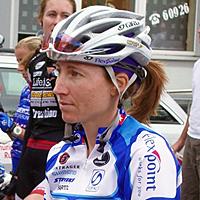News feature, March 7, 2008
Neben, others sue Hammer Nutrition over contamination
Mark Zalewski, North American Editor

|
American cyclist Amber Neben, along with professional triathletes Rebekah Keat and Mike Vine, filed a lawsuit in a California district court last December against Hammer Nutrition, maker of Endurolytes. The lawsuit alleges that the product contained unlisted substances that caused all three plaintiffs to produce positive doping tests, and that further resulted in subsequent doping violations and sanctions.
Court documents obtained by Cyclingnews state that each plaintiff took multiple capsules of the product Endurolytes before competing in events in which each subsequently tested positive for 19-norandrosterone, a metabolite of the banned steroid norandrostenedione found in urine. Arguing for the plaintiffs is Howard Jacobs, well known for his work with Floyd Landis' case as well as other professional athletes involved with doping violations.
The lawsuit, which was initiated by Keat and her twin-sister Simone, states that Simone had the capsules in question independently tested by the WADA-accredited Doping Control Centre lab in Malaysia in June of 2006, all before retaining Jacobs. That lab reported to Keats that the capsules contained dehydroepiandrosterone and 4-androstenedione. Upon further examination, after repeated requests by Keat, the lab also found the samples were contaminated with norandrostenedione.
Keats retained Jacobs and the capsules were sent for testing at a different lab, Anti-Doping Research, Inc., a non-profit research organization started by Don Catlin, the founder of the UCLA Olympic Analytical Laboratory. Vine and Neben then joined the suit, but their actual capsules were not available for testing.
Neben's positive violation came from the 2003 Montreal world cup race while she was racing for T-Mobile, which at the time was also run as the USA Cycling Women's Development Team, headed by Mike Engleman. Hammer Nutrition supplied Engleman and the team with product.

|
Neben took a voluntary suspension before being handed a six-month, reduced sanction. The reduced sanction from a possible two years to six months came from the Court of Arbitration for Sport, along with a strong criticism of USAC by the majority, citing supplement contamination as the likely cause of the positive and chastising USAC for "encouraging the use of supplements, including Hammer Nutrition products..." which "underscored the total disregard for the warnings USADA and IOC have issued for years."
However, the decision also stated that the Hammer Nutrition products analyzed in the case did not contain prohibited substances and the dissenter, Christopher Campbell, cited that a variety of sources, such as food or drink, could have caused the positive.
In response to this Jacobs told Cyclingnews the additional testing by Keat that found contamination reopens the door for the argument. That even though the testing was done after the Neben decision, and with different samples, it shows that there is a possibility that the Hammer Nutrition products Neben took could have been contaminated. Jacobs said that the products analyzed in Neben's arbitration were not the actual ones Neben ingested, due to a delayed notification by USADA. "Yes, she had some [products] tested but not from the same bottles," he said. "Since that time we have had additional testing. Those weren't from the same bottle or the same lot. USADA had not notified her for some time about her positive and by that point the [actual] supplements were gone."
In particular to Neben's part of the law suit, the logic that is being set forth is that supplements obtained in a similar fashion (i.e. not identical ones) that do show contamination represent enough evidence to show liability by Hammer Nutrition in her positive violation. "What [the arbitration] found is that the positive was by contamination and she was only taking Hammer products," said Jacobs.

|
The multi-cause lawsuit against Hammer Nutrition alleges negligence, liability, breach of implied warranty, misrepresentation and violation of business code - alleging that Hammer Nutrition either uses raw materials with banned substances or does not manufacture the products correctly to avoid contamination. The ingredient list for Endurolyte capsules listed on the Hammer Nutrition web site includes: sodium chloride, potassium, Vitamin B-6, manganese, calcium, magnesium and L-Tyrosene.
The lawsuit asks for damages that include loss of past and future income as well as compensation for pain, suffering and humiliation for all three athletes.
In the response portion of the lawsuit, Hammer Nutrition generally denied all of the plaintiffs' allegations against it, citing many stock defenses such as comparative fault, or that other actions by the plaintiffs could have caused the outcome - as well as a statute of limitations violation and a general lack of evidence.
In a press release sent by Jacobs to various media outlets, Neben said, "Testing positive and being suspended from cycling was one of the most painful experiences in my life. Despite the fact that I have never taken steroids, my career and my accomplishments have been unfairly maligned. It is my hope that with this lawsuit, I can finally put this event behind me."
Hammer Nutrition declined to specifically comment to Cyclingnews regarding the case, saying that its web site had a reaction to the case and the press release sent by Jacobs. "It is unfortunate that the plaintiffs have decided to take their case to the court of public opinion," the statement said. "We trust that the media and the public will allow due process and the courts to deal with this matter before rushing to judgment. While we empathize with the challenges that these three athletes face by virtue of their positive drug tests, they are directing the blame for their situation in the wrong direction. We are certain that when all of the facts are presented in a court of law, Hammer Nutrition LTD. will be vindicated of any wrong doing."

|
However, company owner Brian Frank did reveal his feelings on the matter to Triathlete Magazine saying, "We have hundreds, if not thousands of athletes that take our products. The fact that three used them and got caught up in false positives for nornadrostendione is a stretch. The suit has been filed in Orange County, and we'll be defending it under product liability defense. It's odd their lawyer is sending out releases, trying us in the court of public opinion. We've been making products for 21 years, with athletes like Scott Tinley and Scott Molina using them without fail. It's unfortunate. We've seen Tyler (Hamilton), all these athletes that will do or say anything to clear their name. With this there's no basis whatsoever."
Specific to Neben, Frank told Triathlete Magazine: "She also claims contamination, but they had 14 products tested, and all of them tested negative. That was one of the most tested teams in the U.S. We were supplying them through Mike [Engleman's] (U.S. Women's Cycling Development Program director and founder) women's development team, which was also the T-Mobile team, so not T-Mobile per se. But the funny thing is she tested positive at a race in Quebec. All her team-mates were tested and using the same product out of the same containers, and none of them tested positive."
In response to these and other comments made by Frank, Jacobs told Cyclingnews: "I must say that Brian Frank has gone a little further regarding his comments against the athletes, which I think he might regret." Jacobs also said that this is not new territory for him. "Every company that I've sued has had a similar reaction and then have settled, after the outrage by the company." Jacobs also said that in a similar case of his that did go to trial, involving Olympic swimmer Kicker Vencil, the jury awarded him $600,000.

